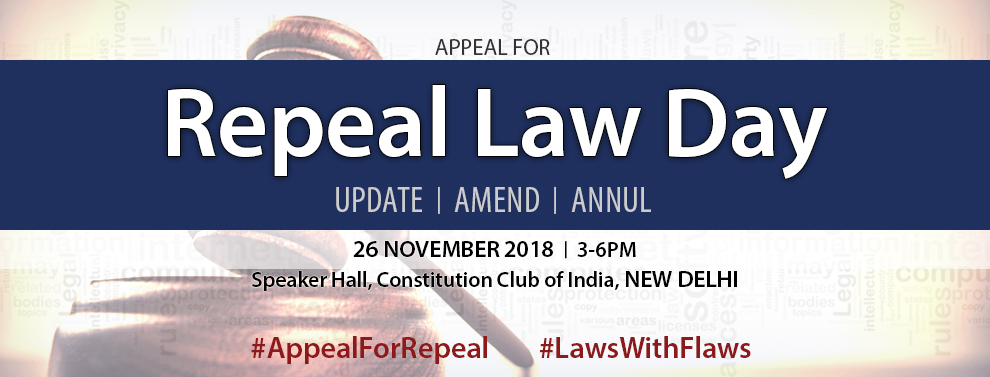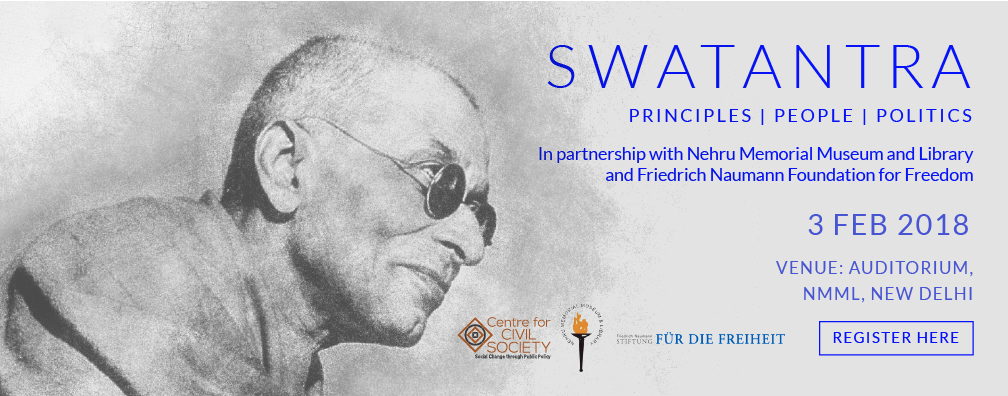You are here
Conferences
Appeal for Repeal Laws Day 2018

Repeal of Laws:India, one of the largest democracies in the world with an ever-rising population, has had, several statutes that with the advent of time have become obsolete, redundant or repetitive. In addition to this, there is the matter of inconsistent language and dissemination- making it difficult for an ordinary citizen to access and comprehend the plethora of legal information with ease. This increased transaction cost coupled with glaring redundancy further breeds fertile grounds for corruption, discouraging engagement of individuals and firms with the society/ economy at large. Centre of Civil Society (CCS) initiated the 'Repeal of 100 Laws' Project in 2014 with the aim to identify laws that could be repealed on account of three reasons
For the 2018 edition of the Repeal of Laws initiative the following state compendiums have been prepared:
|
APPEAL FOR REPEAL LAW DAYCentre for Civil Society, in an effort to institutionalize the repealing of laws as a constitutional practice for the Republic of India, would like to bring together like-minded organizations, scholars, academicians and lawyers to acknowledge 26 November as the Appeal for Repeal Law Day. Its objectives are:
The target is to bring together 70-80 dedicated individuals under one roof and to engage in constructive dialogue around the potential processes required for the institutionalization of the repeal of laws. The idea is to deliberate over the existing structures and processes for repealing laws in India, and envisaging practices which can be adopted moving forward. |
ipolicy for Young Leaders | August - September 2018
 ìpolicy is our flagship 3 day introductory course in Public Policy. The course involves a variety of interactive learning methods including dynamic games, talks, dialogues, and documentaries, designed to provide participants with opportunities to explore and share ideas about policy-based solutions to social problems from a liberal perspective.
ìpolicy is our flagship 3 day introductory course in Public Policy. The course involves a variety of interactive learning methods including dynamic games, talks, dialogues, and documentaries, designed to provide participants with opportunities to explore and share ideas about policy-based solutions to social problems from a liberal perspective.
Why should you attend ìpolicy?
- To gain exposure to a wide range of topics especially in the areas of livelihood, governance, education, poverty, law, corruption, politics and more
- To network and interact with fellow participants coming from diverse backgrounds and disciplines representing leading colleges from all over India and abroad.
- To enhance analytical, public speaking, and presentation skills through working groups, role play, discussions and debates
- To join our vast alumni and academic network of over 7000 CCS graduates
You can apply to more than one program at a time.
| ìpolicy Dates | Venue, City | Application Deadline | |
| 24-26 August 2018 | New Delhi | 15 August 2018 | |
| 31 August-2 September 2018 | Bangalore | 25 August 2018 | |
| 21-23 Septmeber 2018 | Chennai | 07 September 2018 | |
| 28-30 Septmeber 2018 | Mumbai | 12 September 2018 |
 |
"ìpolicy has enabled me to critically examine the present perspectives I inhabit regarding policy design and policy implication. It has inspired me to gain a holistic understanding of markets and their ways of working in the policy domain."
Shilanjini Bhattacharya, TISS Mumbai |
 |
"I am incredibly grateful for this opportunity, it has provided insight, fresh ideas and a liberal perspective. I learnt a lot both from interaction with facilitators and peers. I was encouraged to think more critically, ask more questions and discouraged from accepting things on face value. I think my approach to policy formulation has changed a great deal in terms of how I now perceive institutions, trade, incentives, public interest and govt intervention."
Evita Rodriguez, FLAME Pune |
 |
"Textbooks provide a very one-dimensional and theoretical approach to issues. Ipolicy definitely showed the current trends interms of the practice approach and introduced me to new perspectives and ways of looking at issues. The most important thing is that in each session, we did not just stop with identifying the problem but also came together to formulate possible solutions to the same."
Shreya Rangarajan, TISS Hyderabad |
Swatantra: Principles, People, Politics

Swatantra Party, founded in 1959 by C. Rajagopalachari, was India’s first and only national political party to advance principles of social justice, free enterprise, personal liberty, secularism, and individual rights. Advocating a ‘politics of ethics’, the party featured the voices of prominent liberals such as Minoo Masani, N G Ranga, Piloo Mody, and offered the only substantive alternative to Nehruvian socialism and the monolithic ‘Congress Party system’ which had emerged post-Independence. After securing substantive electoral victories through 1960s—emerging as the single-largest opposition party in the fourth Lok Sabha (1967-71)—the Party disintegrated in the early seventies, following Rajagopalachari’s withdrawal from politics and demise. Through its brief but strong tenure of 15 years, the party exercised wide reach throughout India, and exerted significant pressures on issues ranging from industry to foreign policy.
Swatantra Party was a significant and unique intervention in the larger narrative of modern Indian politics, and merits sustained engagement from scholars and intellectuals today. Upon procurement of over 27,000 pages from the defunct Swatantra Party's offices in Mumbai, Centre for Civil Society aims to store the archive at Nehru Memorial Museum and Library. The launch of the archive is marked with a day-long Conference on Saturday, 9 December, 2017 at the Auditorium, Nehru Memorial Museum and Library on the eve of C. Rajagopalachari's birth anniversary.
To know more about the panel, and conference schedule, view the Conference Concept Note.
For details contact:
Arushi Vats (arushi@ccs.in)
+91 9811575503
2nd Law and Liberty Conference
Theme: Perspectives on Liberty in a Digitised India
Law and Liberty Conference (LLC) is our flagship annual academic congregation exploring the interstices of legal thought and practice, and their relation to the idea of liberty. A key component of modern social and political orders, liberty is seen as one of the founding principles of rule of law. The spheres of liberty are manifold, with implications for economic, civic, and personal practices of individuals and communities. LLC provides an opportunity for rigorous academic analyses and dialogue on issues most pertinent to the exercise of liberty, and the role of law in securing and impeding the same. The Law and Liberty Conference is a unique opportunity for academicians, scholars, practitioners, and students to interrogate the constraints and challenges to the principle and practice of liberty, and understand how these may be mitigated.
Law and Liberty Conference 2017 is being organized by Centre for Civil Society in collaboration with Law and Technology Society, National Law School of India University, Bangalore
Objectives
- To highlight emerging concerns in the domain of individual liberty and the legal and regulatory frameworks which enable the flourishing of a liberal society
- To explore the opportunities and challenges to the preservation and extension of liberty across digital objects and sites
The 2017 edition of the conference will have 3 thematic sessions:
- Digitising Governance and Public Service Delivery: Digital modes of governance are under adaption at an unprecedented scale. The e-Kranti initiative of National e-Governance Plan (NeGP) has outlaid the digitization of over 44 public service delivery verticals at Centre and State level and development of Common Service Centres across the country. Such e-governance initiatives have developed a range of digital interfaces, from websites to mobile applications and bio-metric enabled Smart Cards. Experiments independently and in collaboration with corporate and NGOs, such as ITC’s e-Choupal, Gyandoot in Madhya Pradesh, Aksh Broadband in Rajasthan, IRCTC, and Passport Seva, have successfully developed and tested intranet portals for a range of functions, from produce procurement to facilitating Government to Citizen (G2C) digitised service delivery.
- Regulatory Frameworks for Aggregator and Sharing Economy: The need for revisiting principles framing regulations is accentuated by the emergence of aggregators and sharing economy in India, and its exponential growth in on-demand transport, crowd-funding, and hospitality sectors. The sharing economy radically transforms the conventional definitional tenets of labour, establishments, services, and the consumer-provider relationship by developing peer-to-peer sharing, dynamic pricing, and service ownership. With the growing relevance of sharing economy in fostering skill development and micro-entrepreneurship, an agile, enabling framework that balances consumer protection with ease of doing business is requisite.
- Regulating Data Services and Digital Payments: Support functions of expanding digital literacy and inclusion are also mapped through projects such as the National Optic Fibre Network (NOFN), and ongoing TRAI consultation on provision of Free Data in rural India without violating the bright-line principles set against zero-rating. Additionally, the impetus for a cashless economy is mandated through a separation of payments and banking, and the regulatory frameworks governing the two. This entails a complete digitization of payments and receipts within government, with an eye to increase the reach and incentivizes the usage of digital payments. From autonomy in regulation to legislative revision of Payments and Settlement Systems Act (2007) mandating open access, interoperability, competition and innovation—the role of private entities in facilitating the development and delivery of digital services in governance and exchange is growing exponentially and demanding systemic redesigning of regulatory frameworks and rethinking of the role of the state
Registration deadline: 20th November 2017
Registration Fee: Students: INR 500/-; Others: INR 1000/-
For details contact:
Jatin Garg (jatin@ccs.in) or Arushi Vats (arushi@ccs.in)
+91-9915608674 | +91-11-2653 7456; ext.-25
9th School Choice National Conference
THEME- Direct Benefit Transfers in Education: Policy, Politics, Parents
Registration deadline: 04th November 2017
Objectives
- To discuss and debate various dimensions of DBT including ideation, the theory of change, identification of areas of application, implementation and various challenges at each step.
- To explore DBT as a tool to bring greater transparency, accountability, and efficiency in the education system through empowering parents and enabling choice of access in education.
The 2017 edition of conference will have 3 thematic sessions:
- DBT experiments & models- National and global: The session addresses the current status of Direct Benefit Transfers- across sectors and geographical boundaries. This involves examining the various DBT- centric experiments and models that have been carried out around the world on a microscopic level and framing them in an Indian context. This discussion on respective experiences would help enable the audience to understand the relevance of an alternative such as DBT.
- DBT in Education- Impact, Incentives, Issues: The session would be exploring the issue of learning outcomes that currently plagues the education sector and the potential role that DBT can play in overcoming the same. Panelists will also be elaborating upon the supply and demand of such an alternative, as well as parents’ capacity and readiness for DBT in education. The latter half of the session would be dedicated to understanding the economic and political implications of introducing DBT, since such a scheme would essentially convert the role of the State from being the provider of education into that of being the primary financier of education.
- DBT in Education- Implementation designs and readiness: Building upon the first two sessions, the third panel would delve into the possible scheme designs that DBT in education could manifest into. The panelists will look into the infrastructural and technological requirements of the scheme, and explore the various mechanisms using which DBT can be successfully implemented.
Registration Open: Apply Now
Registration Fee
- NGO Leaders / Research Scholars / School Principals: INR 1000/-
- Students: INR 750/-
- Others: INR 1500/-
For details contact Nitesh (scnc@ccs.in | +91-88003 44700 | +91-11-2653 7456; ext.-16)

